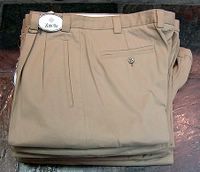Confusion Not Likely Between "ZANELLA" Clothing And Wood Flooring, Says TTAB
A punster might say that Opposer Zanella Ltd., well-known for its high-end men's slacks, was caught with its pants down in its unsuccessful opposition to registration of the mark ZANELLA for wood flooring. Zanella Ltd. v. Saroyan Lumber Co., Opposition No. 91153249 (June 23, 2005) [not citable].

Opposer relied on its use and registration of the mark ZANELLA for trousers and various other items of men's and women's apparel. Based on Opposer's sales (hundreds of millions of $$ in the past 5 years) and advertising expenditures (hundreds of thousands of $$), the Board found that Opposer's ZANELLA mark has "acquired some public recognition," but that this recognition is "mainly confined to the limited segment of high-end trousers, and little else." The proofs fell short of establishing fame, and Opposer did not argue otherwise.
The "crux" of Opposer's case was its assertion that "the goods are commercially related inasmuch as flooring is within opposer's natural scope of expansion." According to Opposer:
"The expansion by apparel designers is a natural one. Apparel and flooring have important characteristics in common. Both are designed and sold based in part on aesthetic, emotional factors such as style, color, and texture. Both are expressions of one's personal image. In the marketing of their flooring products, many designers have aggressively conveyed to the public that their expansion into flooring products is a logical extension of their business and expertise."
Applicant Saroyan Lumber, however, pointed out that, while certain designers like Laura Ashley, Liz Claiborne, Armani may have expanded their range of products through licensing of their very famous marks, Opposer's use of its ZANELLA mark has been limited to clothing. Moreover, Opposer has never licensed its mark.

The Board observed that it was without question that "clothing and wood flooring are not naturally related goods." However, under the doctrine of natural expansion, the first user of a mark possesses superior rights not only against subsequent users for the same or similar goods, but also as to goods "which purchasers might reasonably expect to emanate from it in the normal expansion of business under the mark." The question is whether purchasers would likely be confused "as to sponsorship, affiliation, or connection."
The Board agreed with Applicant:
"Opposer's comparison of its ZANELLA mark with several famous designer marks is, in our view, the proverbial 'comparing apples and oranges.'
"Opposer has not met its burden of showing that a lesser known designer in a more limited clothing field, primarily known for men's trousers, would normally expand its less than famous name brand to wooden flooring, or that purchasers would expect such goods to emanate from the same source."
In ruling against Opposer, the Board delivered one last kick in the trousers, quoting the CAFC's observation that: "We are not concerned with mere theoretical possibilities of confusion, deception, or mistake or with de minimis situations but with the practicalities of the commercial world, with which the trademark laws deal." Electronic Design & Sales Inc. v. Electronic Data Systems Corp., 21 USPQ2d 1388, 1391 (Fed. Cir. 1992).
Text Copyright John L. Welch 2005. All Rights Reserved.




0 Comments:
Post a Comment
<< Home